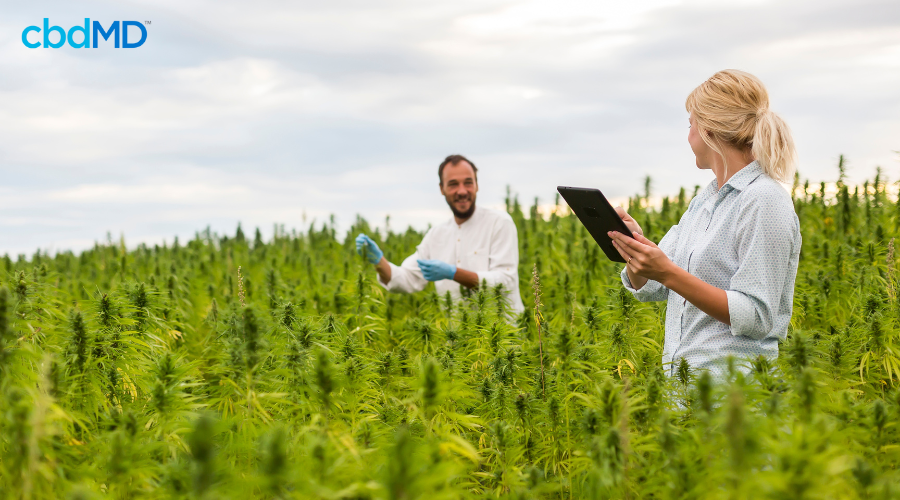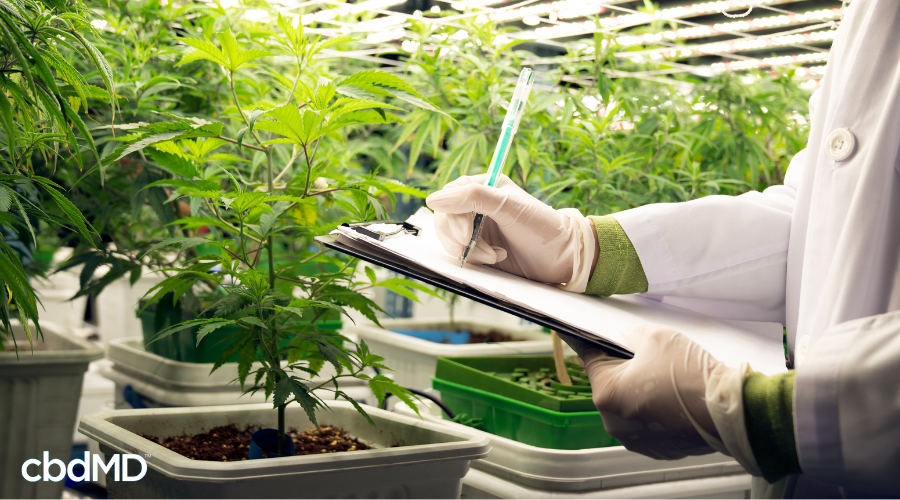As Earth Month continues to inspire a global conversation about sustainable living and eco-friendly practices, we’re putting the spotlight on hemp. Beyond being a buzzword in the environmentally friendly and wellness communities, hemp has the potential to be an important piece of a greener future. With its diverse applications, potential for climate-positive agriculture, and opportunities for everyday health and wellness, the future of hemp is an exciting one.
Keep reading to discover what the future holds for the hemp industry. And check out our whole series on hemp to learn more about its history, benefits, and sustainability, along with tips on how to make your everyday health and wellness routines part of a greener world.
Redefining Hemp's Image Over Time
Once tethered to the misrepresentation of marijuana and the Controlled Substances Act, hemp has had a tumultuous relationship with public perception. However, through concerted efforts in education and advocacy, the veil of misinformation is lifting, revealing hemp's true potential. The historical stigma that has long prevented wider acceptance is giving way to acknowledgment and even excitement in popular culture, signaling a shift in the collective perception toward the plant and its many uses.
A Vast Market on the Horizon
The transformation of hemp is not merely social or cultural; it's a lucrative economic pivot. The global industrial hemp market's impressive growth from $4.9 billion in 2019 to a projected $18.6 billion by 2027 isn't just a fluke, but an organic response to market demand, technological advancements, and supportive legislation. New frontiers in hemp products, from textiles to building materials, highlight the plant's rich versatility and the enthusiasm for sustainable solutions.
The Importance of Visibility and Understanding
Visibility in pop culture, green fashion movements, and wellness trends is bridging the gap, allowing public understanding to catch up with the plant's potential. Celebrities and medical professionals alike are touting the benefits of hemp-based products, which has initiated the ripple effect of making the hemp story more visible, accessible, and better understood. Yet, the work isn't over. Continued education on the plant’s attributes is crucial for demystifying hemp in the mainstream.

Navigating the Legislature Around Hemp Regulation
In the United States and globally, legislation surrounding hemp is in a state of dynamic flux. The 2018 Farm Bill was a monumental step, reclassifying hemp as an agricultural commodity and removing it from the Controlled Substances Act. However, there's still work to be done in refining regulations and addressing the challenges and loopholes that hinder its full potential.
The Farm Bill's Ripple Effects
The 2018 Farm Bill sent ripples of opportunity throughout the hemp industry, unlocking new possibilities for farmers, researchers, and entrepreneurs alike. By legalizing hemp cultivation and removing barriers to interstate commerce, the bill laid the groundwork for a growing market. However, its impact extends beyond the agricultural sector, catalyzing innovation in manufacturing, healthcare, and sustainability initiatives.
The proposed 2024 Farm Bill (extended from the 2023 Farm Bill) holds the potential to further shape the trajectory of the hemp industry. As discussions unfold, proponents are advocating for policies that support responsible growth while addressing key areas for improvement. From refining regulations on cannabinoid potency to streamlining lab testing requirements, there's a concerted effort to ensure that hemp regulation evolves in tandem with industry needs and consumer demands.
Challenges and Opportunities
Despite the progress made, navigating the legislative landscape presents both challenges and opportunities for the hemp industry. One pressing issue is the regulation of popular cannabinoids that cause a euphoric effect, such as THC. With calls to increase the allowable THC limit in hemp products, stakeholders are grappling with questions of potency, safety, and consumer education.
Furthermore, the regulatory framework imposed by agencies like the FDA and DEA poses obstacles to market access and innovation. Addressing these challenges requires collaboration between policymakers, industry leaders, and regulatory agencies to establish clear guidelines that prioritize consumer safety and product quality.
A 2022 congressional panel held by the House Agriculture Subcommittee on Biotechnology, Horticulture, and Research reflects a proactive approach to addressing these issues. Panelists identified key areas for improvement, including revising bank regulations, easing limitations for hemp companies, and providing a USDA stamp of approval for hemp shipments between different jurisdictions.

Hemp's Role in Addressing Climate Change
As we confront the urgent challenges of climate change, hemp emerges as a powerful ally in the transition to a more sustainable future. Its unique properties make it a valuable asset in mitigating carbon emissions, promoting regenerative agriculture, and driving innovation across various industries.
Cultivating a Carbon-Negative Crop
By harnessing the power of hemp cultivation, we can not only mitigate environmental degradation but also restore balance to ecosystems and promote biodiversity. With its rapid growth cycle and deep rooting system, hemp has the remarkable ability to capture more carbon per acre than many other cash crops. This makes it a promising candidate for carbon farming practices, offering a viable solution to reduce greenhouse gas emissions and combat climate change.
The Innovation of Hemp-Based Products
Beyond its role in carbon sequestration, hemp's versatility as a material holds immense potential to drive sustainable innovation. From bioplastics to packaging, hemp offers a renewable alternative to conventional materials derived from fossil fuels. By replacing high-impact products with hemp-based alternatives, we can significantly reduce our reliance on finite resources and minimize waste pollution. Hemp as a cornerstone of the circular economy reflects a shift towards regenerative practices that prioritize long-term sustainability.
Driving Economic Growth and Sustainable Development
By creating new markets and industries, hemp has the power to stimulate economic growth and generate employment opportunities, particularly in rural areas, agriculture, and manufacturing sectors. The scalability of hemp cultivation and the diverse range of products derived from it open doors to a wealth of green jobs and entrepreneurial ventures. As consumer demand for natural and sustainably sourced products continues to rise, the hemp industry is poised for significant growth, offering a pathway to a thriving and resilient economy.

Expanding the Reach of Cannabinoids with Research
Research on cannabinoids is another area where hemp's future looks promising. As more evidence shows the potential benefits of cannabinoids for health, there's a real chance to create a strong wellness industry based on hemp. This research isn't just about feeling better – it could also change the way we think about medicine and healthcare.
The Wellness and Medicinal Potential of Cannabinoids
The exploration of cannabinoids such as CBD, CBG, CBN, THCV, and Delta 9 THC unveils a treasure trove of potential benefits for human health. From temporary pain relief and improving focus to reducing everyday stress and promoting relaxation, cannabinoids hold promise as natural options to help with a wide range of everyday wellness issues. Moreover, research into the endocannabinoid system sheds light on its pivotal role in maintaining balance within the body, highlighting the therapeutic potential of cannabinoid-based interventions.
At cbdMD, we’ve backed our products by science to ensure you’re reaping the best benefits. By conducting studies on CBD safety, efficacy, and even its effectiveness for dogs, along with rigorous third-party testing and COAs, our products are substantiated by research and fortified by trust.
Ongoing Innovations and Discoveries
Innovation is at the heart of cannabinoid research, driving advancements in extraction techniques, formulation methods, and product development. With each new discovery, the landscape of cannabinoid science evolves, opening doors to novel treatment modalities and preventive health strategies. From exploring the synergistic effects of different cannabinoids to uncovering the therapeutic potential of lesser-known compounds, the possibilities are endless.
Researchers are also exploring the diverse applications of cannabinoids beyond traditional medicinal use. From skincare products to dietary supplements, cannabinoids are finding their way into a myriad of consumer goods, offering holistic wellness solutions grounded in scientific research.
Advocating for the Future of Hemp
The future of hemp isn't just about predicting an industry's growth, it's about urging everyone who cares about the environment and holistic well-being to take action. It's about recognizing that hemp is more than just a product to buy and sell – it's a powerful force for positive change. When we educate ourselves, speak up for hemp, and support the hemp community, we're helping to build a cleaner, more enlightened world.
Every time you make a thoughtful purchase, advocate for hemp, or have a conversation about its benefits, you're contributing to a better future for us all. Together, we're planting the seeds for a greener world, with hemp leading the way.
Join us in celebrating hemp this Earth Month and beyond. By working together, we can create a future where sustainable living is a natural part of everyone's lives. Tell us how you integrate hemp into your green lifestyle by tagging us on Facebook, Instagram, or X.

